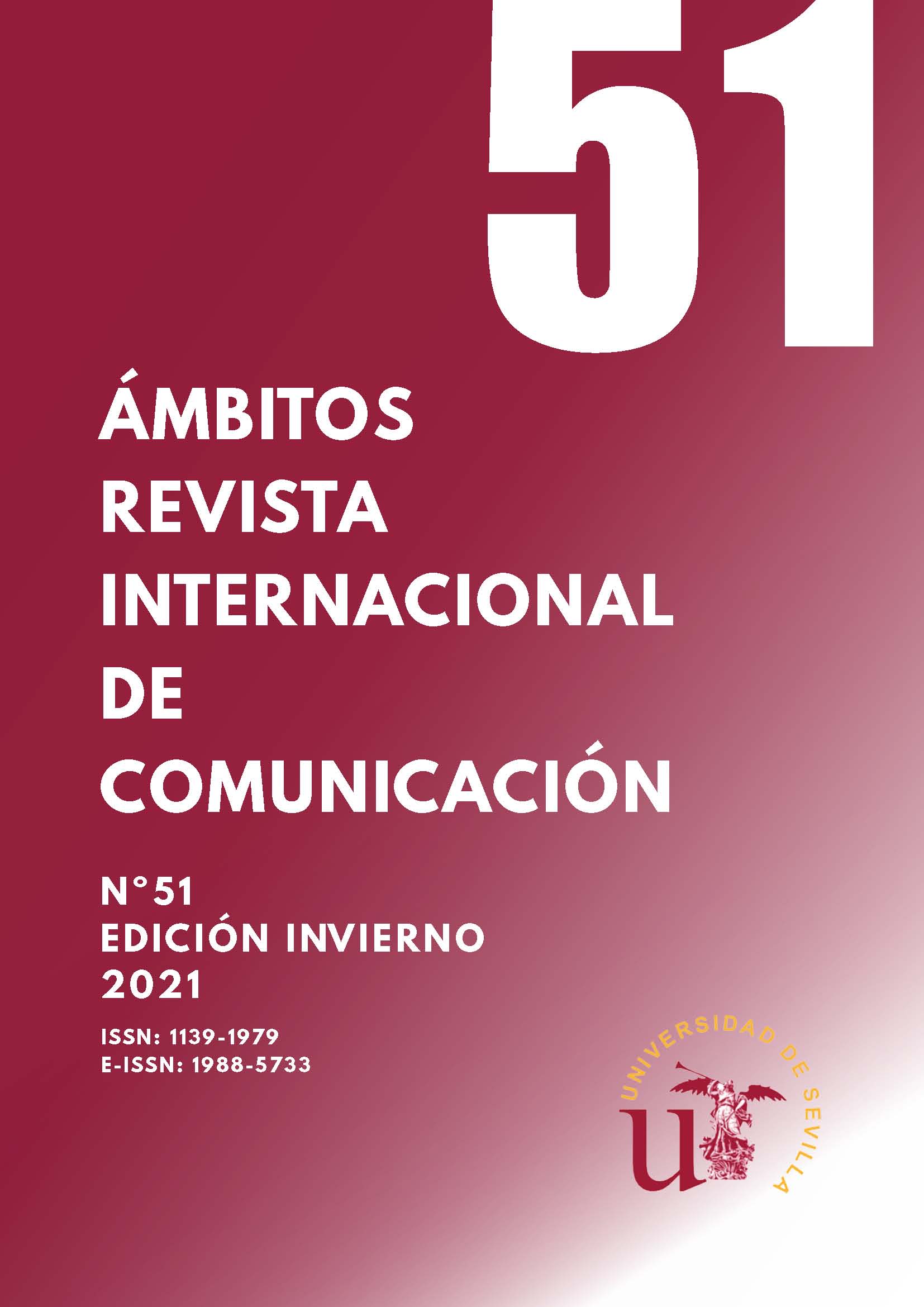Gender violence on Twitter according to Vox in the regional elections of Andalusia
Gender violence on Twitter according to Vox in the regional elections of Andalusia
DOI:
https://doi.org/10.12795/Ambitos.2021.i51.08Keywords:
Comunicación política, Redes sociales, Internet, Vox, Twitter.Abstract
Political communication has changed after the appearance of the Internet and social net-works. In this sense, it is essential to understand that the communication landscape has been transformed. The main objective of the research is the use of Twitter as a tool for political communication, taking as a case study the far-right political party Vox regarding gender violence in the autonomous elections of Andalusia in 2018.
The methodological design is qualitative and quantitative by analyzing the official Twitter accounts of Vox, Santiago Abascal (president of the party) and Francisco Serrano, candidate for the Andalusian regional elections of 2018. For this, the statistical program SPSS has been used in which they have been analyzed more than
1000 tweets related to a topic of great relevance to the party such as gender violence and the content analyses.
The results obtained show that gender violence is a topic discussed on Twitter by the three profiles analyzed, although the dissemination and periodicity of updates on this topic are different from each other. As a main conclusion, it can be advanced that Vox has made an exceptional use of Twitter as a discursive narrative tool. Similarly, gender violence does not appear on social networks as often, although in the case of the Andalusian candidate it is a recurring theme in his interventions on Twitter.
Downloads
References
Álvarez, A. (2015). Estrategias de comunicación política en las elecciones autonómicas canarias de 2015, en Casero, A., López, P. y H. Doménech (coord.) Periodismo, comunicación política y redes sociales en el contexto de campaña electoral. VII Congreso Internacional Latina de Comunicación Social, 7, 9, 10 y 11 de diciembre de 2015, La Laguna (Tenerife, España).
Casero, A., Feenstra R. A. y S. Tormey, (2016) Old and New Media Logics in an Electoral Campaign: The Case of Podemos and the Two-Way Street Mediatization of Politics, en The International Journal of Press/Politics [en línea], nº 21(3) Junio 2016, SAGE Journals. https://bit.ly/3qyo9z9
Castells, M. (2001), La galaxia Internet. Reflexiones sobre Internet, empresa y sociedad. Areté.
Castro, L. (2012). El marketing político en Estados Unidos: el caso Obama, en Revista Académica del CISAN-UNAM [en línea] 2012, 7 (Enero-Junio). ISSN 1870-3550. https://bit.ly/37FpBqT
Cubero, A. (2015). La campaña de Obama 2008. Madrid: Universidad Pontificia Comillas. Recuperado de https://bit.ly/3qA1Qck
Del Palacio, J. (2019). ¿Fascismo o nacionalpopulismo? Un análisis del ideario político de Vox. En Müller, J. (Coord.), La sorpresa Vox: las respuestas a 10 grandes preguntas que todos nos hacemos sobre Vox (pp. 114-127). Deusto.
García, N. (2012). Redes sociales en Internet: implicaciones y consecuencias de las plataformas 2.0 en la sociedad. Universitas.
González, B. (2019). Autonómicas en Andalucía: ¿A qué votantes que estaban huérfanos se dirigió Vox para conseguir 12 escaños? En Müller, J. (Coord.), La sorpresa Vox: las respuestas a 10 grandes preguntas que todos nos hacemos sobre Vox (pp. 74-84). Deusto.
López, M., (2012) Twitter como instrumento de comunicación política en campaña: Elecciones Generales 2011, en Cuadernos de Gestión de Información [en línea], nº 2, 2012, Universidad de Murcia. https://bit.ly/39UC3Wi
Mancera, A. y Pano, A. (2013). El discurso político en Twitter. Anthropos Editorial.
Martínez, A. y Méndez, M. (2004). La campaña de los partidos. En: Crespo V (ed.) Las campañas electora-les y sus efectos en la decisión del voto. Tirant lo Blanch.
Michavila, N. (2019). ¿De dónde salen sus 400.000 votos? perfil sociológico del votante de Vox. En Müller, J. (Coord.), La sorpresa Vox: las respuestas a 10 grandes preguntas que todos nos hacemos sobre Vox (pp. 24-34). Deusto.
Müller, J. (2019). La sorpresa Vox: las respuestas a las 10 grandes preguntas que todos nos hacemos sobre Vox. Deusto.
Rodríguez, R. y D. Ureña, (2011) Diez razones para el uso de twitter como herramienta en la comunicación política y electoral en Comunicación y pluralismo [en línea], nº 10, 2011, Universidad Pontificia de Salamanca. http://goo.gl/pzM1eN
Downloads
Published
How to Cite
Issue
Section
License
Ámbitos. Revista Internacional de Comunicación is an open access journal, which means that all content is freely available at no charge to the user or their institution. Users may read, download, copy, distribute, distribute, print, search or link to the full text of articles, or use them for any other lawful purpose, without seeking prior permission from the publisher or author. This definition of open access is in accordance with the Budapest Open Access Initiative (BOAI).

Unless otherwise noted, all content in the electronic edition is distributed under a "Creative Commons Attribution-NonCommercial-ShareAlike 4.0 International License". You can consult the informative version and legal text of the licence here. This should be expressly stated in this way where necessary.
In case of acceptance of the manuscript, the authors cede the rights of the work for its publication to Ámbitos. Revista Internacional de Comunicación under the Attribution-NonCommercial-ShareAlike 4.0 International license contract (CC BY-NC-SA 4.0). The authors retain copyright and third parties are authorised to copy, distribute and make use of the work, provided they comply with the terms and conditions set out in the licence
- Cite the authorship and the original source of publication (journal, publisher and URL of the work).
- Do not use them for commercial purposes.
- If you remix, transform or create from the material, you must release your contributions under the same license as the original.
More information can be found at https://creativecommons.org/licenses/by-nc-sa/4.0/deed.es


















